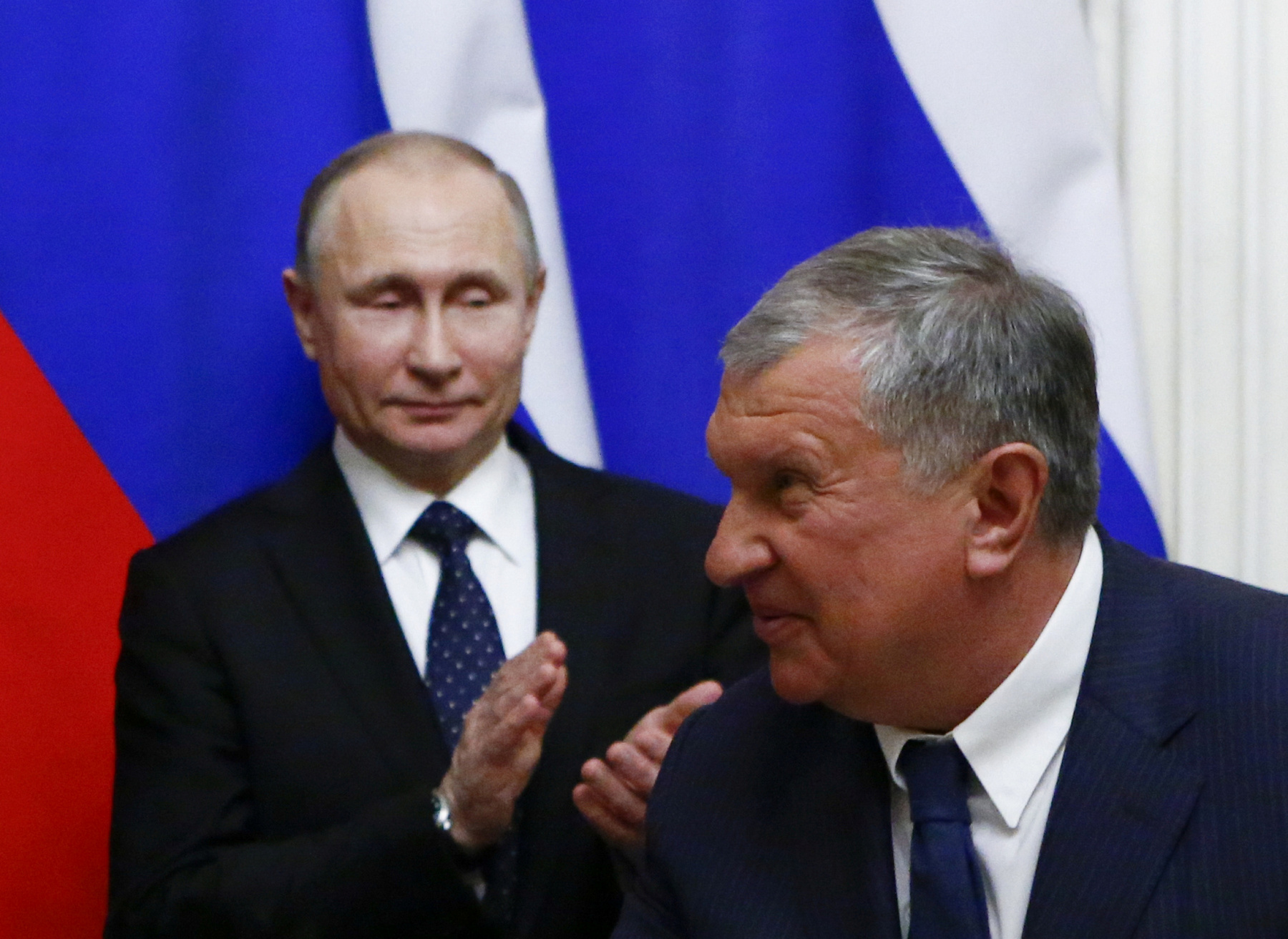Rosneft has sold its Venezuelan assets. The move comes just over a month after the US Treasury sanctioned a Rosneft subsidiary, Rosneft Trading, for its actions supporting Venezuelan regime. The company denounced the move as ‘illegal’ and an act of abuse, but its announced withdrawal from Caracas raises the question of whether the sanctions were successful in changing Russia’s strategy in Venezuela.
The risk of the US sanctioning Rosneft directly has increased notably over the last month. In February, when benchmark Brent crude oil was still trading around US$45-50 per barrel, Rosneft could feel confident that while the US Treasury sanctioned its subsidiary, that a move against the parent firm was unlikely. As the world’s second largest oil producer, any such action would risk disrupting the global hydrocarbons market. Sanctioning Rosneft would also significantly impact British oil giant BP, and risk ripple effects across the world – from Iraqi Kurdistan to India to Houston, given the various exploration and hydrocarbon joint ventures the firm is involved in.
However, after the collapse of the OPEC+ cartel at the beginning of March, and Russia and Saudi Arabia’s ensuing supply war, the calculation has changed significantly. Russia may be well positioned for fighting for global supply and willing to sustain record low prices for some time; but the new environment means the US is no longer against upwards price shocks. Furthermore, the widespread perception that Russia’s actions are in part motivated by desire to bankrupt US shale producers, means there are already prominent voices calling for revenge in Washington.
The collapse of global oil demand due to COVID-19 could also make the present a particularly opportune moment for the US to take more strident action against Rosneft while mitigating long-term market impact. Some Venezuelan oil is now selling for below US$5 per barrel, eviscerating potential returns from Rosneft’s support for the regime of president Nicolas Maduro; the global price collapse means buyers’ are less incentivized to take the risk of buying such oil, which Washington has explicitly warned against. Meanwhile the US has also made clear it will only further escalate sanctions on Venezuela and Iran during the global crisis in an effort to accelerate regime change.
But Rosneft’s move does not appear to actually have resulted in a change to the company’s strategy in Venezuela. Instead, it is only the latest example of the company’s shrewd and creative deal-making.
Rosneft’s precedent for such action is myriad: from its 2014 ruble bond issuance to repay hard currency debt financing, its 2016 ‘privatization’ of Bashneft, and the subsequent sale of 19.5 per cent stake in Rosneft itself, which it managed to complete even after Western banks and Beijing both rejected earlier plans to participate, securing a crucial Russian-Qatari tie-up in the process.
The sale of its Venezuelan assets is the latest such example. Rosneft will receive a package of 9.6% of its own shares from Rosneftegaz, the 100% Russian state-owned company that had heretofore held the majority 50%-plus-one-share stake in the firm. Rosneft’s domineering CEO and Board Chariman, Igor Sechin, is also Chairman of the Board at Rosneftegaz.
At current market prices, the share transfer is worth about US$4 billion but no direct cash will change hands. Nonetheless, the move should benefit Rosneft’s financial position slightly – it no longer has to carry the Venezuela risk on its own books and is thus effectively a bailout by the Russian state. Yet remarkably this quasi bailout does not mean the government will be taking a larger stake in Rosneft or receiving more dividends. Instead, the share transfer effectively means that Russian taxpayers are bailing out Sechin’s long-running Venezuela strategy while giving up majority control of his company.
The 9.6% stake will be held by a Rosneft subsidiary, allowing the firm to treat them as quasi-treasury shares. Unlike standard treasury shares, however, these can still be voted, and receive dividends. Effectively this will result in no change given Sechin’s control of both Rosneftegaz and Rosneft. However as Rosneftegaz’s share in Rosneft has fallen to 40.4%, if the former Rosneftegaz were to be sanctioned, ironically Rosneft would no longer automatically fall under these restrictions given the US Treasury’s 50% rule for sanctions applicability.
However, it is not clear if Rosneftegaz will be the ultimate owner of the Venezuelan assets. Rosneft has refused to say which Russian government-owned firm it sold the assets too, while Kremlin officials have also stayed mum. This is in line with Russian legislation allowing firms to refuse to disclose information if doing so would result in an increased risk of sanctions. The firm could ultimately be transferred to a state-owned firm already used in sanctionable activity such as Iran-related Promsyryeimport.
Leaving it with Rosneftegaz would enable Sechin to save face domestically, however, though this is likely little concern. His aforementioned deal-making at Rosneft has resulted in numerous crises in the past – from helping fuel the ruble’s December 2014 collapse to resulting in the jailing of economy minister Alexei Ulyukayev – with no negative repercussions for Sechin or his firm.
Although Rosneft has claimed the sale as an attempt to protect its shareholders, the only shareholder who really matters is Sechin. He is unlikely to abandon his decade-plus effort to cultivate Caracas’ oil assets, and whose regime he has often lauded publicly for years. Despite frequent media speculation over Russian intervention, the reality, however, is that Russian – and Rosneft – support for Caracas has waned in recent years. No new loans have been announced since the end of 2016. Sending a plane full of soldiers to attract headlines and demonstrate public support for Maduro is magnitudes cheaper. Venezuelans’ living standards have already plummeted and millions have fled as refugees over the last five years – trends likely only to be exacerbated by a sustained oil price but the US-backed attempt to install a new government under Juan Guaido has failed and no alternative is yet in sight.
Caracas’ economic collapse has only furthered the Maduro regime’s dependence on Russia, which is happy to ‘play the long game’ and hold its Venezuelan assets as a key card at the negotiating table about the country’s future. Russia’s embassy in Venezuela has already attempted to downplay fears the move will result in a change in operations in the country.
It remains to be seen how Washington will respond. Shortly after announcing the sale, Rosneft spokesperson Mikhail Leontyev said that Rosneft is waiting on US action, implying the lifting of sanctions on Rosneft Trading and another trading subsidiary, over the move. Leontyev is known for his provocative comments and in reality, probably expects no such thing, though it does mitigate against the risk of further sanctions being placed on Rosneft itself with some already hailing the move as a success for US sanctions policy. However, the sale of Rosneft’s Venezuelan assets should be seen as little more than a series of accounting tricks aimed at precisely such mitigation. If Washington were to lift the restrictions on Rosneft Trading and TNK trading, this would be tantamount to rewarding creative deal-making rather than an actual change in Russian support for Venezuela.










